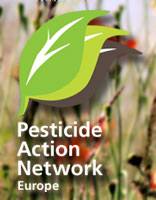26 September 2006, Budapeste
Global Coalition of Health and Toxics Experts Demand that WHO Stop Irresponsible Promotion of DDT Spraying
Groups denounce scandalous "clean bill of health" for DDT, call for solutions to malaria that don't put children at risk.
A broad coalition of health and toxics experts from every continent called on the World Health Organization to reverse its aggressive promotion of DDT for malaria control and expressed outrage at the agency for a statement giving DDT spraying inside people's homes a "clean bill of health."
"It is criminal that WHO should make a politically-motivated announcement like this under the guise of protecting the health of children in Africa," said Dr. Paul Saoke, Director of Physicians for Social Responsibility in Kenya. "We need real solutions to malaria in Africa, not a return to widespread reliance on a failed silver bullet that risks the health of communities already battling this deadly disease."
WHO's September 15th press statement described a "new" approach to malaria control with DDT at the centerpiece of an aggressive effort to eradicate the disease. Sources inside the agency, however, report that there has been no reassessment of DDT risk and no official revision of WHO's policy, which already allowed minimal use of DDT in accordance with the global Stockholm Convention. One of WHO's chief malaria experts, Dr. Allan Schapira, resigned abruptly prior to the announcement promoting DDT use by the controversial new head of WHO's global malaria program, Dr. Arata Kochi. Roughly half of the Roll Back Malaria staff have reportedly resigned since Kochi took over leadership of the program.
"DDT harms human health and is not the best way to control malaria," says Henry Diouf of Pesticide Action Network Africa. "Malaria is a disease of poverty, and addressing poverty is the long term solution. In the short term, safer and more effective approaches like bed nets, rapid identification and treatment of malaria cases and local education about mosquito control are needed in Africa - not more DDT."
In their announcement before hundreds of government officials at the Intergovernmental Forum on Chemical Safety in Budapest, Hungary, Pesticide Action Network International, the International POPs Elimination Network and the International Society of Doctors for the Environment emphasized their support for the Stockholm Convention's approach to DDT. The global toxics treaty, which has been adopted by 129 countries, calls for a phaseout of DDT but allows short term use in some countries while safer and more effective alternatives are put in place.
"We reached a consensus on the adverse health effects of DDT in the course of negotiating the Stockholm Convention," says medical toxicologist Romeo Quijano, professor at the College of Medicine of the University of Philippines in Manila, President of Pesticide Action Network Philippines, and Board member of the Pesticide Action Network (PAN) Asia and the Pacific. "WHO's announcement undermines this consensus, and goes against the agency's mandate to be at the forefront of protecting health and the environment worldwide."
"Why has WHO suddenly decided to undermine an important global treaty?" asks Dr. Mariann Lloyd-Smith, co-chair of the International POPs Elimination Network and Director of the Australian National Toxics Network. "The agency's job is to help countries control malaria and reduce their reliance on DDT. Since there is no new evidence supporting increased use of DDT, we can only assume WHO's leadership is listening to the DDT advocates in the U.S."
Dr. Kochi's announcement has strong support from the Bush Administration, which recently changed the policy of the US Agency for International Development to increase reliance on DDT in its malaria programs. Bush Administration supporter Senator Tom Coburn was quoted in WHO's press statement, which was released from Washington DC rather than WHO headquarters in Geneva. "The recent shift in US policy reflects a well organized DDT promotion campaign by a handful of aggressive advocates," says Kristin Schafer, Program Coordinator for Pesticide Action Network North America. "This effort is supported by conservative organizations and think tanks with funding from the U.S. pesticide industry, including Monsanto."
"The international community must listen to the voices of people directly affected by DDT, whether in India and China where DDT is produced or in African countries where its use is being promoted," says Jayakumar Chelaton, Director of THANAL (Thanal Conservation and Environment Network). Chelaton works with the Eloor-Edayar communities in India that are calling for clean up of contamination caused by the DDT production facility there. "We join in demanding that WHO reverse this irresponsible promotion of DDT, and we urge the international community to investigate how politics managed to trump science and common sense at WHO."
Decades of scientific evidence counter the claims of the DDT promoters that its use for malaria control is harmless. Human reproductive disorders associated with DDT are well documented, including undescended testes and poor sperm quality, premature delivery and reduced infant birth weights and reduced breast milk production. One recent study found clear neurological effects-including developmental delays-among babies and toddlers exposed to DDT in the womb Researchers in Mexico and South Africa found elevated levels of DDT in the blood of people living where DDT was used to control malaria, and breastfed children in those areas received more DDT than the amount considered "safe" by WHO and FAO. Studies have also linked exposure to increased risk of breast cancer, and the International Agency for Research on Cancer lists DDT as a possible human carcinogen.
More effective and safer approaches to malaria control are now being used in many countries. For example, Vietnam reduced malaria deaths by 97% and malaria cases by 59% when they switched in 1991 from trying to eradicate malaria using DDT to a DDT-free malaria control program involving distribution of drugs and mosquito nets and widespread health education organized with village leaders. Mexico phased out DDT use in 2000 and implemented a successful integrated and community-based approach.
— ENDS —
< Back


